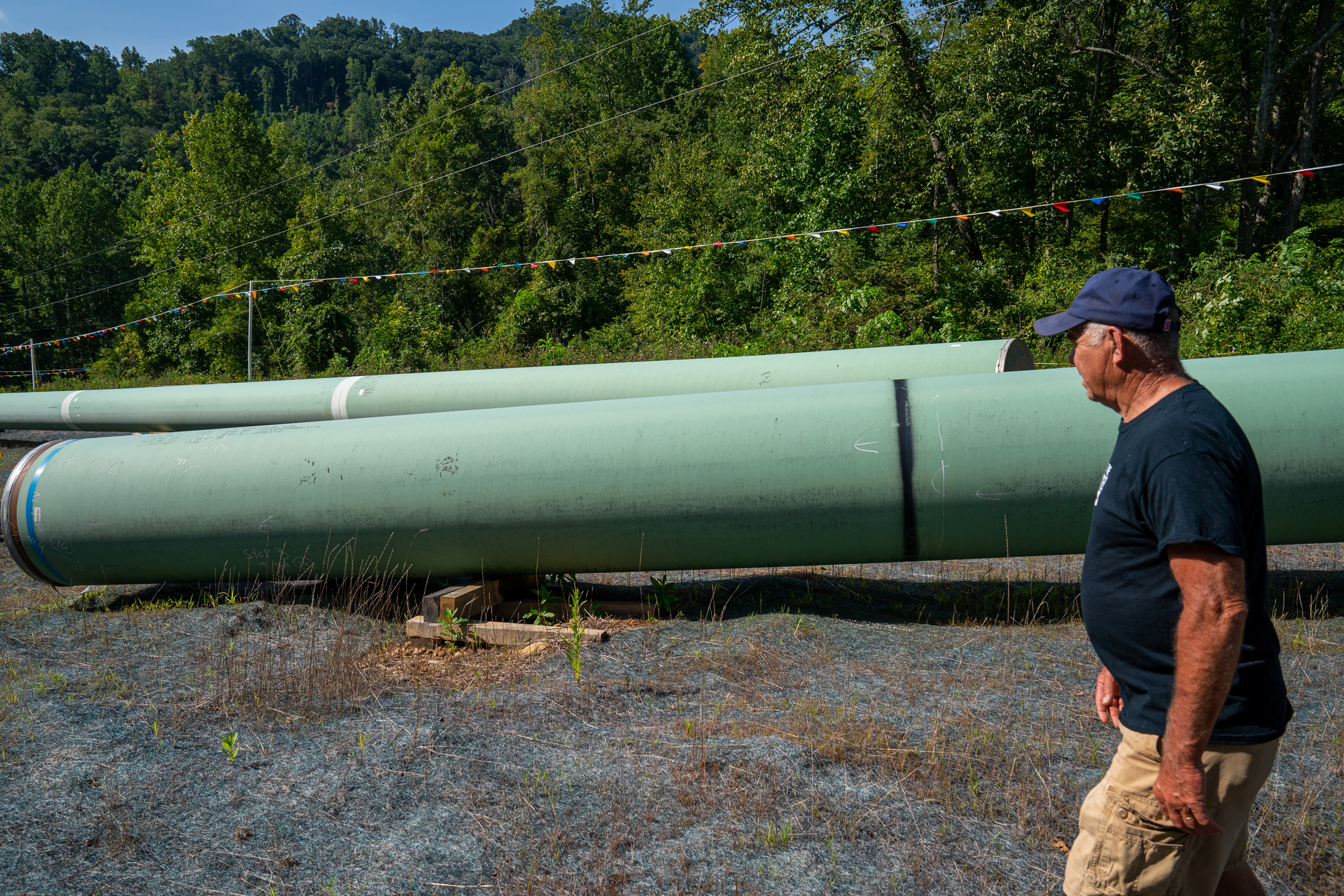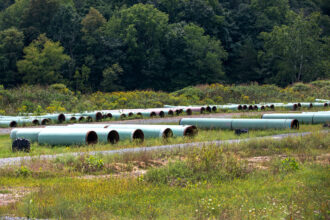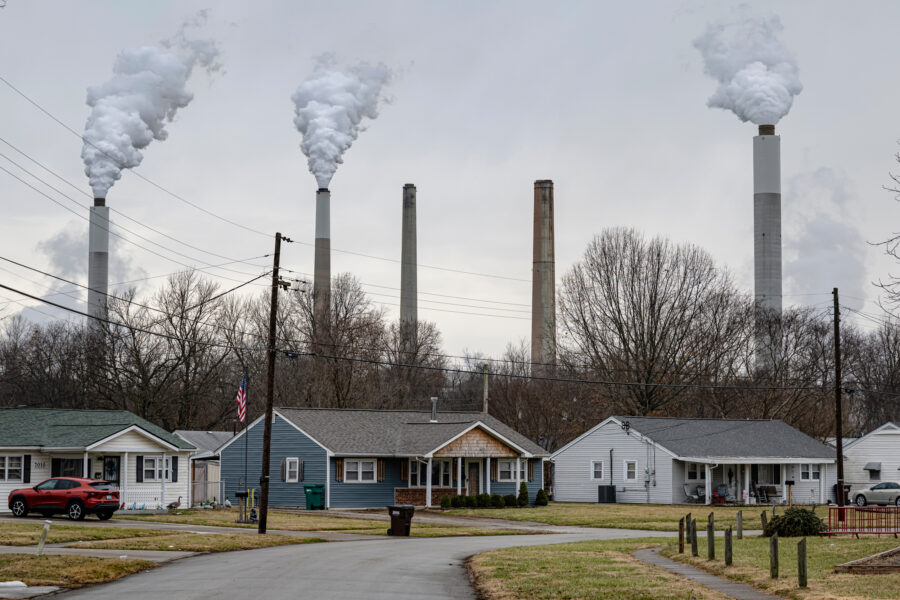As plans for natural gas pipeline expansions in southwest Virginia are rapidly taking shape, proposals from two major energy firms to transport gas through the Appalachian regions of Virginia and North Carolina are fueling community concern.
Critics are disturbed by the route of the two proposed pipelines, now under review amid a surge of applications to build massive data centers in the region. Among their concerns: the lines, and compressor stations related to gas distribution, will be laid within hundreds of feet of each other in some locations in a North Carolina county and potentially disrupt rural lifestyles and landscapes.
The Federal Energy Regulatory Commission (FERC) and Virginia environmental regulators are reviewing long-running requests from Mountain Valley Pipeline LLC and the Williams Companies Inc. for billion-dollar extensions that would link to pivotal and existing crosscountry networks.
Mountain Valley Pipeline is seeking to build 31 miles of pipeline from Virginia into North Carolina, extending a 303-mile network that now cuts from the Marcellus and Utica shale along the Pennsylvania border through West Virginia to southern Virginia. MVP’s proposal, called the Southgate Extension, has been reviewed and revised since 2020. Mountain Valley is also requesting to add compressor stations along its main line: three in West Virginia and one in Montgomery County, Virginia, about 70 miles near where Southgate would begin.
The Williams Companies is requesting approval to build 55 new miles of pipeline to bolster its Transcontinental Gas Pipe Line, better known as Transco, that transports fracked gas from the Texas Gulf Coast across about a dozen states. The Williams Companies calls its proposal the Southeast Supply Enhancement Project, or the SSEP, a pipeline that will expand capacity for Virginia, the Carolinas, Georgia and other states.
A FERC decision is expected for Mountain Valley Pipeline, which is operated by EQT Corp., by the end of the year. FERC is expected to review the proposal by The Williams Companies, based in Oklahoma, by February.
The Williams Companies also recently submitted a separate proposal for a pipeline expansion in Virginia, a plan that emerged in May during a quarterly earnings call. The Williams Companies said it was aiming to run pipe from Southern Virginia to “serve the power-hungry Virginia market” with a northern extension, dubbed the Power Express, and later told the Cardinal News website that the project was “in the early development stage.”
The rush for more reliance on gas is likely to gain pace.
The Virginia Department of Energy announced just weeks ago a partnership with the Williams Companies as well as Red Post Energy LLC, whose parent company is based in Australia, and Enbridge Inc., headquartered in Canada. The initiative will study new natural gas infrastructure proposals for “locations between Roanoke and Bristol,” according to a department release on Oct. 9.
The study “will evaluate site suitability, environmental considerations, interconnection requirements, and economic benefits including job creation, tax revenue, and regional development opportunities,” the department said. The release offered no deadline for the study’s completion.
All these proposals would thread miles more natural gas pipeline in a state that is seen as a hot property for companies seeking data centers as part of their growth strategy.
Those proposals are being considered as Virginia oversees other new operations coming on line. TC Energy, formerly known as TransCanada, is set this month to launch a pipeline, nearly 49 miles in length, near the Tidewater region. The Virginia Natural Gas local distribution company is also seeking by October 2027 to expand a compressor station in the city of Chesapeake, in southeastern Virginia, to boost smaller intrastate pipelines.
But some communities are raising concerns about the speed and breadth of many of these proposals—and they are complaining that towns and residents are having a difficult time sorting through the construction requests and possible risks.
Community advocates, in both states, said they want to know how regulators and towns are supposed to assess cumulative impacts and allow for proper public involvement in the process.
“How confusing and complicated,” Jessica Sims, Virginia field coordinator with Appalachian Voices, an environmental nonprofit advocacy group based in North Carolina, said about the pipeline proposals and FERC’s analysis of the projects.
Data center proposals, tied to artificial intelligence work sought by technology and financial companies, are changing the landscape of some swaths of rural America. Virginia alone could see electricity demands triple by 2040 because of data center growth. The state, home to several federal agencies, has been keen to accommodate business interests tied to AI.
The Virginia General Assembly’s policy research unit has estimated that a new 1.5 gigawatt gas plant, enough to power about 375,000 homes, would need to be built every 18 months for 15 consecutive years as part of the energy mix needed if all the data center proposals become reality.
The expansion of natural gas is among the priorities of the Trump administration. President Donald Trump is a proponent of fossil fuels and early in his second term he issued an executive order “Unleashing American Energy.” Trump declared a widely disputed national energy emergency, which some companies such as Mountain Valley Pipeline have used to support pipeline expansion proposals.

Mountain Valley spokesperson Shawn Day said the company’s main line, a 303-mile project running from Northwest West Virginia into Pittsylvania County completed in 2024, ensured reliability. Day pointed to an April 2025 report by FERC and the nonprofit North American Electric Reliability Corporation, another regulatory group, that “credited MVP with helping to avoid” gas shortages “during extreme weather and periods of record demand early this year.”
“Opponents of the MVP Mainline claimed for years that the (main line) project wasn’t needed, and yet barely six months after it entered operation, the project was operating at its full capacity, providing a critical supply of natural gas for residential and business use and electricity generation,” Day said in an email. The Southgate extension will prove to be as useful if not critical for the region, MVP contends in its proposal.
The Williams Companies also focused on rising needs in its application for expansion. In an email to Inside Climate News, it described the SSEP as a “$1.2 billion investment that will strengthen energy reliability and deliver meaningful economic benefits across the region.”
SSEP “will meet or exceed all safety and environmental standards, while supporting climate and energy goals,” the Williams Companies statement said. “Assertions to the contrary misrepresent both the facts and our record of responsible development.”
That is not how some community groups—critical of coal mining in the region and fearful of the rapid demand of pipelines across the countryside—view the energy companies’ ambitions and regard for local residents. They fear that the development will harm their way of life.
“It all comes down to there has not been any transparency, any real data showing a need for all of this coming through here,” said Tiffany Haworth, executive director of the nonprofit Dan River Basin Association, who also questioned whether all the data centers will be built. There is a risk that energy companies are predicting and producing for a market that may not exist—and communities may suffer, she said.
“People want to turn their lights on. … We get that. But we already have a pipeline going through there,” Haworth said. “We as an organization don’t feel that the harm that it is going to cause to our waterways and our recreational outdoor recreational economy—over a million people get their drinking water from these rivers—makes sense.”
Kasey Kinsella, associate director of 7 Directions of Service, an Indigenous advocacy group that opposes the pipelines, said the companies’ plans, if completed, would destroy any chance of natural harmony.
“All of this is just so absurd,” Kinsella said.
Southgate in Virginia
Big energy companies and their related businesses have been eager to provide services in some of the fastest-growing states. Mountain Valley Pipeline and the Williams Companies have both focused on a North Carolina location—Rockingham County, population 91,000—as the choice for their expansion ambitions.
Mountain Valley Pipeline, operating in Virginia since 2014, first proposed the Southgate Extension in 2018 as a pipeline to extend from its main line, starting in Pittsylvania County, Virginia, and running 31 miles deep into north central North Carolina. That extension was approved in 2020 by FERC—but on the condition that the main line received its necessary approvals.
The main line construction faced several legal disputes for nearly a decade. In 2023, MVP benefited from congressional pressure orchestrated by Sen. Joe Manchin of West Virginia. Manchin pushed its permit through during the federal budget process then. By June 2024, the main line was operating.
The Southgate proposal, too, has faced some trouble from regulators. The Virginia Air Pollution Control Board in 2021 reviewed and rejected MVP’s permit request for Southgate based on health concerns. The board found the pipeline path would cause potentially disproportionate harm to Black residential areas.
In late 2023, months after the main line approval, MVP revised its Southgate plan with some major changes.
MVP’s proposed new Southgate would traverse 31 miles rather than 75 miles–and ends at a different place. MVP’s previous Southgate proposal had terminated in Alamance County in North Carolina; the new plan will end in nearby Rockingham County.
FERC in 2024 released an environmental assessment, that the amended project “would result in fewer environmental effects than the” original MVP plan. It “would not constitute a major federal action significantly affecting the quality of the human environment” although there would be some impacts to prime farmland, forested areas and wetlands, FERC said.
FERC notably found that the Southgate proposal would not be likely to “adversely affect” federally endangered animals in the area, including the northern long-eared bat and tricolored bat. The project, FERC also said, would “not result in significant effects,” on state-listed species, including the bigeye jumprock, which the Virginia Department of Wildlife has designated as having “high conservation need.”
FERC also found that MVP’s proposed method of horizontal directional drilling, or boring that goes under streams instead of digging ditches across them, would avoid environmental harm. Horizontal drilling “greatly reduces potential effects on surface waterbodies, particularly compared to open-cut crossings. In general, typical pipeline effects on waterbodies are avoided with trenchless methods,” FERC said in its 2024 assessment.
Williams Companies’s Plan
The Williams Companies’s SSEP is also proposed to run from Pittsylvania County in Virginia and end in Rockingham County. The Williams Companies aims to build two loops of pipeline–a 31-mile section crossing the Virginia and North Carolina border is called the “Eden Loop” and a 24.2-mile stretch in North Carolina is dubbed the “Salem Loop.” Both would link to its pipeline running from Texas.
In an environmental assessment report in 2024, FERC reviewed Williams Companies’s plan and found no “significant impact” to the “quality of human environment. The effect on “vegetation would be minor and mostly temporary to short term,” and “effects on wildlife from construction and operation of the Project would not be significant,” according to the FERC report.
FERC also assessed the cumulative impacts of both MVP’s Southgate and The Williams Companies’s SSEP proposal based on a myriad of aspects, including wetlands. MVP’s proposal would affect 18.2 acres of wetlands during construction, it said, and the Williams Companies’ Eden Loop would affect 27.5 acres of wetlands.
Because of the overlapping construction area and timetable of the projects, “cumulative effects on surface water quality may occur,” FERC said. It noted that “The magnitude of effects would depend on the specific timeframe of crossing the same waterbodies.”
This story is funded by readers like you.
Our nonprofit newsroom provides award-winning climate coverage free of charge and advertising. We rely on donations from readers like you to keep going. Please donate now to support our work.
Donate NowSims of Appalachian Voices said FERC did not go far enough in looking at the double whammy of two pipeline projects—with trucks, traffic and construction—converging on Rockingham County. “I’m not sure how anyone could look at that much information and come to that conclusion,” Sims said of FERC’s report.
Sims said having the two projects, which could be as close as within 200 feet of each other in some areas of the criss-crossing routes, could be problematic if there were structural failures in either network. She questioned how regulators would track which company was responsible for erosion and sediment problems that could choke flora and fauna.
“If you have projects that are so closely routed with construction at the same time, the blame–if there are sedimentation problems–it’s even more complicated,” Sims said.
Broader Community Concerns
Haworth of The Dan River Basin Association, based in North Carolina, said she and others are concerned that MVP’s and the Williams Companies’s projects will upend years of work to protect the environment and the river that flows through eight counties in Virginia and North Carolina.
The river basin, a 3,300 square mile watershed, is fed by the Smith, Mayo, Banister, Hayco and Sandy rivers. The waterways have weathered troubling industrial demands before, she said, and residents across state borders have some vivid memories of a time when textiles dominated the economic and environmental landscape.
The dye from a factory in Martinsville, Virginia, would flow into the Smith River and change the color of the stream ”running down all the way down into North Carolina,” Haworth said. In 2014, one of Duke Energy Corp.’s steam stations in Eden, North Carolina, sprung a leak, leading the U.S. Department of Interior to find that approximately 39,000 tons of ash and 27 million gallons of ash pond water” were released and resulted in a threat to endangered species and migratory birds.
“We’ve worked really hard for two decades, working with municipalities and state government, to make sure that these natural resources remain protected, preserved for future generations, and pipelines do not quite fit into that,” Haworth said.
Haworth wondered how FERC could find “no significant impact” on the quality of life for people who will live near miles of heavy construction. “When they say minimal impact, no amount of impact is worth hurting people. A million people’s drinking water,” she said.
Kinsella of the advocacy group 7 Directions of Service said she is concerned about every part of the expansion. No one should overlook, she said, the impact of compressors along the pipeline trail. They too will add noise and stress, she said, particularly so to neighborhoods that have historically been burdened with industrial pressures.
The energy companies may try to monetarily compensate the residents with onetime financial checks but that won’t really address how their lives will be changed, she said.
“What will the cost be when there are health impacts from an expanded compressor station?” Kinsella said. “My heart goes out to these working class folks along the main line route who, their land, their water, their livelihood, psychologically, has been just so beat up over the past 10 years in this fight.”
FERC is expected to make a decision on Southgate by the end of the year. The Virginia Department of Environmental Quality (DEQ) also is undergoing a water protection permit process that will assess streams and wetland impacts. A public hearing for the permit is scheduled Thursday night and a decision is expected Dec. 8.

Melanie Davenport, director of DEQ’s cross-media programs, said the agency has requested erosion and sediment stormwater protection plans, which would prevent loose dirt from washing into waterways.
FERC is expected to decide SSEP by February. Virginia DEQ’s also is reviewing and will have to approve two water quality permits for the project.
The North Carolina Department of Environmental Quality, which is also reviewing the proposals, recently approved a permit for Mountain Valley Pipeline for the Southgate Extension but the project cannot move forward without FERC approval.
About This Story
Perhaps you noticed: This story, like all the news we publish, is free to read. That’s because Inside Climate News is a 501c3 nonprofit organization. We do not charge a subscription fee, lock our news behind a paywall, or clutter our website with ads. We make our news on climate and the environment freely available to you and anyone who wants it.
That’s not all. We also share our news for free with scores of other media organizations around the country. Many of them can’t afford to do environmental journalism of their own. We’ve built bureaus from coast to coast to report local stories, collaborate with local newsrooms and co-publish articles so that this vital work is shared as widely as possible.
Two of us launched ICN in 2007. Six years later we earned a Pulitzer Prize for National Reporting, and now we run the oldest and largest dedicated climate newsroom in the nation. We tell the story in all its complexity. We hold polluters accountable. We expose environmental injustice. We debunk misinformation. We scrutinize solutions and inspire action.
Donations from readers like you fund every aspect of what we do. If you don’t already, will you support our ongoing work, our reporting on the biggest crisis facing our planet, and help us reach even more readers in more places?
Please take a moment to make a tax-deductible donation. Every one of them makes a difference.
Thank you,













